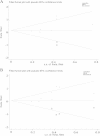Polymorphisms in estrogen receptors predict the risk of male infertility: a meta-analysis
- PMID: 25128001
- PMCID: PMC4141121
- DOI: 10.1186/1477-7827-12-79
Polymorphisms in estrogen receptors predict the risk of male infertility: a meta-analysis
Abstract
Background: Estrogen receptors play an important role in mediating estrogen action on target tissues, and the estrogen is relevant to male infertility. Single nucleotide polymorphisms (SNPs) in estrogen receptors may be associated with the risk of male infertility. A variety of case control studies have been published evaluating this association. However, the accumulated studies have shown inconsistent conclusions.
Methods: To further determine the potential association between the four common SNPs (rs2234693, rs9340799, rs1256049 and rs4986938) in estrogen receptors gene and male infertility, this meta-analysis was performed according to the 10 published case control studies. The odds ratio (OR) and 95% confidence interval (CI) were used to evaluate the strength of the associations.
Results: It was revealed that the sub-group analysis by the ethnicity, for the rs2234693, a significant association in the comparison of CC vs. TT (OR = 0.61, 95% CI: 0.40-0.93), CT vs. TT (OR = 0.67, 95% CI: 0.49-0.93) and CC + CT vs. TT (OR = 0.66, 95% CI: 0.49-0.89) in the Asian population with male infertility. For rs9340799 polymorphism, increased risks were observed for the comparison of AA vs. GG (OR = 1.75, 95% CI: 1.15-2.68) and AA vs. GA + GG (OR = 1.38, 95% CI: 1.02-1.88). For rs1256049 polymorphism, the comparison of the GA vs. GG (OR = 1.52, 95% CI: 1.00-2.31) and AA + GA vs. GG (OR = 1.74, 95% CI: 1.03-2.94), also increased risks present in Asian and Caucasian population, respectively.
Conclusions: The rs2234693C allele was associated with the decreased risk for male infertility; however, the rs9340799AA genotype and the rs1256049GA genotype were associated with an increased risk for male infertility.
Figures





Similar articles
-
Association of ESR1 Xba1 (rs9340799) With Male Infertility: A Systematic Review and Meta-Analysis.Am J Mens Health. 2025 Jan-Feb;19(1):15579883251319134. doi: 10.1177/15579883251319134. Am J Mens Health. 2025. PMID: 39989275 Free PMC article.
-
The influence of ESR1 rs9340799 and ESR2 rs1256049 polymorphisms on prostate cancer risk.Tumour Biol. 2014 Aug;35(8):8319-28. doi: 10.1007/s13277-014-2086-7. Epub 2014 May 24. Tumour Biol. 2014. PMID: 24859835
-
Meta-analysis of the association of the rs2234693 and rs9340799 polymorphisms of estrogen receptor alpha gene with coronary heart disease risk in Chinese Han population.Int J Med Sci. 2013;10(4):457-66. doi: 10.7150/ijms.5234. Epub 2013 Mar 2. Int J Med Sci. 2013. PMID: 23471591 Free PMC article.
-
Estrogen receptors alpha (rs2234693 and rs9340799), and beta (rs4986938 and rs1256049) genes polymorphism in prostate cancer: evidence for association with risk and histopathological tumor characteristics in Iranian men.Mol Carcinog. 2012 Oct;51 Suppl 1:E104-17. doi: 10.1002/mc.21870. Epub 2012 Jan 6. Mol Carcinog. 2012. PMID: 22228197
-
Association of polymorphisms in estrogen receptors (ESR1 and ESR2) with male infertility: a meta-analysis and systematic review.J Assist Reprod Genet. 2014 May;31(5):601-11. doi: 10.1007/s10815-014-0212-5. Epub 2014 Mar 20. J Assist Reprod Genet. 2014. PMID: 24647635 Free PMC article.
Cited by
-
Determination of testicular estrogen receptor alpha expression of male chickens (Gallus domesticus) with age.Vet World. 2019 Jul;12(7):994-997. doi: 10.14202/vetworld.2019.994-997. Epub 2019 Jul 8. Vet World. 2019. PMID: 31528023 Free PMC article.
-
Androgen receptor (AR)-CAG trinucleotide repeat length and idiopathic male infertility: a case-control trial and a meta-analysis.EXCLI J. 2018 Dec 17;17:1167-1179. doi: 10.17179/excli2018-1744. eCollection 2018. EXCLI J. 2018. PMID: 30713477 Free PMC article.
-
Association of ESR1 Xba1 (rs9340799) With Male Infertility: A Systematic Review and Meta-Analysis.Am J Mens Health. 2025 Jan-Feb;19(1):15579883251319134. doi: 10.1177/15579883251319134. Am J Mens Health. 2025. PMID: 39989275 Free PMC article.
-
Association between polymorphisms in genes encoding estrogen receptors (ESR1 and ESR2) and excreted bisphenol A levels after orthodontic bracket bonding: a preliminary study.Prog Orthod. 2018 Jul 2;19(1):19. doi: 10.1186/s40510-018-0219-z. Prog Orthod. 2018. PMID: 29961922 Free PMC article.
-
CORRELATIONS BETWEEN POLYMORPHISMS OF ESTROGEN 1, VITAMIN D RECEPTORS AND HORMONAL PROFILE IN INFERTILE MEN.Acta Endocrinol (Buchar). 2016 Apr-Jun;12(2):137-144. doi: 10.4183/aeb.2016.137. Acta Endocrinol (Buchar). 2016. PMID: 31149078 Free PMC article.
References
-
- De Kretser D, Baker H. Infertility in men: recent advances and continuing controversies. J Clin Endocrinol Metab. 1999;84:3443–3450. - PubMed
Publication types
MeSH terms
Substances
LinkOut - more resources
Full Text Sources
Other Literature Sources
Medical
Miscellaneous

